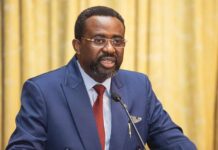…calls for partnerships to develop technical expertise
Evidence abounds to show that Ghana has more than enough human resources to address its water challenges and it would be an even bigger disaster if these persons are not given the adequate platforms to showcase their solutions.
This is according to the Ambassador of Denmark to Ghana, Tom Nørring, who says that these persons must be harnessed, not only as entrepreneurs, but also by being incorporated into public and private institutions.
Speaking on the sidelines of the Next Generation Water Action (NGWA) Multi-Hub Finals, which was hosted in collaboration with the Technical University of Denmark, he suggested that the performance of young Ghanaian entrepreneurs and academics at the event has further bolstered his belief.
“A day like this is proof of the enormous mass of talent; there are a lot of well-educated people with great ideas and drive. The talent and ideas are there and of course, we need structures to ensure that these do not go to waste because that would be equally as bad, maybe worse, as water going to waste or any other resource going to waste,” he said.
Earlier, in his welcome address, Mr. Nørring called for partnerships within and across countries to better share skill and technical know-how. “In Denmark, we are strong believers that coming up with innovative and creative solutions to our problems requires collaboration. Innovation happens when we put our best minds together from across the spectrum… we also need to work together across borders, and with this case-competition, we are truly getting global input to our local challenges.”
With the World Health Organisation suggesting that for every US$1 invested in water and sanitation, there are direct and indirect economic returns – to individuals and households, the health sector, and agricultural and industrial sectors, ranging from US$3 to US$34 – the Dean of the Faculty of Built Environment at the Kwame Nkrumah University of Science and Technology (KNUST), Prof. Samuel Amos-Abanyie, called for investment in water and sanitation to translate solutions proffered through research to economically viable businesses.
“What has been lacking is not workable solutions. What we have needed is translating these solutions to start-ups and getting the necessary support to push these innovations. Research must translate into entrepreneurial ideas, which simultaneously solve problems, whilst generating employment opportunities and revenue,” he said.
On his part, Chief Manager Responsible for Technology and Innovation at the Ghana Water Company Limited (GWCL), Ing. Richard Appiah Otoo, expressed his outfit’s commitment to supporting young and innovative persons who are finding practical solutions to the nation’s water and sanitation challenges.
This, he said, is evident as GWCL, in partnership with Danish firm, LE34, presented a challenge to the participating students to find innovative solutions to enable GWCL map out its network in a bid to manage the high level of non-revenue water, which currently stands at about 50%.
“Through our Research and Innovation unit, we continue to identify and define all the problems that we face as a utility company and get start-ups, academia and other private companies to develop solutions which will be mutually beneficial. This is one of many such avenues that we seek to explore,” he stated.
The Next Generation Water Action initiative engages students from leading technical universities, as well as early-stage startups, in Denmark, Mexico, India, Korea, Kenya and Ghana to build skills and apply their technical disciplines, innovation and solutions to challenge and catalyse water solutions towards smart liveable cities.
At the finals, Bluesparks, a start-up which applies technology to recycle water used car wash facilities and Infitech, which developed water level sensors to be used in storage tanks to eliminate spillage, were Ghana’s representatives. In the end, Bluesparks was named in the top five start-ups which participated.
Also, Group Two from the KNUST, composed of Francis Adu-Boahene, Michelle Agbozo and Zenobia Kusi-Afrakoma, were awarded a €1,000 scholarship accelerator programme.










